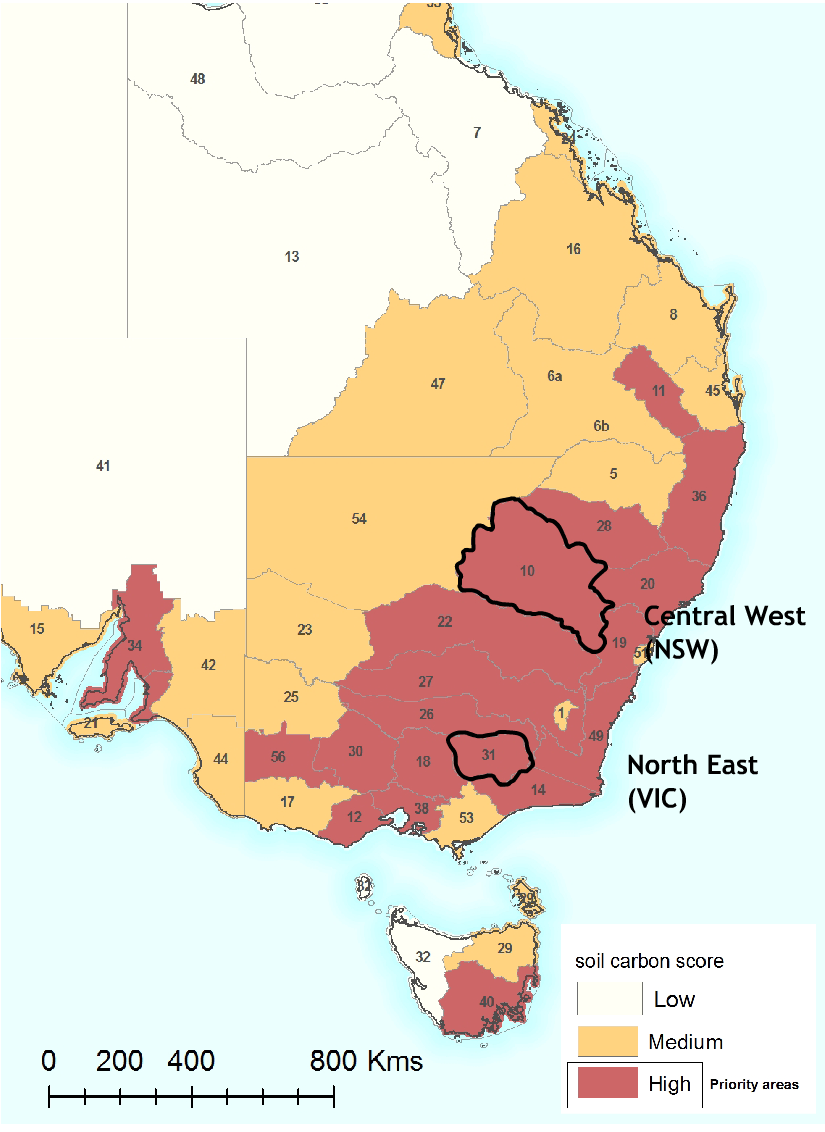These locally initiated programs are funded by grants from Caring for Our Country, a $2.25 billion, five-year Australian federal grant program that supports communities by funding projects for biodiversity, coastal and aquatic habitats, and sustainable farm practices. Farmers and graziers manage around 70% of the Australian landscape.
According to the Caring for Our Country website, it focuses on achieving an environment that is healthy, better protected, well-managed, resilient, and that provides essential ecosystem services in a changing climate. The program sets a target of 12,000 farmers and 30,000 graziers in priority regions [see map for soil carbon priority regions in eastern Australia] who "have improved their management to reduce the risk of soil acidification and soil loss through wind erosion, water erosion and improve carbon content of soils, or have adopted other improved soil management methods."
 |
| Eastern Australia, showing the project areas of the two Catchment Management Authorities, on a map showing the priority areas for increasing soil carbon via land management. |
North East, Vic
The North East CMA began its soil carbon program in July 2009, offering soil testing and agronomy training to interested farmers and graziers. With an estimated 2300 landholders in the region, they have seen 300 sign up for testing and are expecting 500 for the program's first phase.
The program does not offer incentives or payments. Soil sampling with a hydraulic corer is done to a depth of 30 cm at the start, with resampling at the same locations planned in 4 years. Soil analysis includes soil carbon, texture, pH, trace minerals, CEC, and phosphorus, calcium, magnesium, and sodium. Participating farmers choose an agronomic adviser and participate in training sessions to interpret soil test results and get agronomic advice. The recommended agricultural practices for increasing soil carbon are open-ended, and include increasing the perenniality of pastures, increasing ground cover, leaving residual dry matter after grazing, improving the sustainability of nitrogen and phosphorus fertilizer use, and the use of intensive rotational grazing.
Chris Reid, the land stewardship manager for the North East Catchment Management Authority, says the North East CMA had done soil carbon work with Landcare, the community-based partnership for environmental protection and management. "Soil carbon had been on our radar for several years." Increasing soil carbon, he says, "is a benefit to farmers, a benefit to them individually." He says there is no trouble getting people on board. "They feel that this isn't just an environmental government program."
Suzanne Johnstone of the North East CMA notes that she is already seeing genuine change as a result of the program, in the awareness and attitudes of participants toward soil health and soil management.
See the program's newsletters.
Central West, NSW
The Central West CMA soil carbon program offers an incentive of $6,000 to participating farmers and graziers, and is similarly open-ended about eligible practices. It also involves soil sampling, to a depth of 10 cm, with modeling used to estimate soil carbon at greater depths, with a repeat sampling at the same transect in 5 years. Cauchi has done the soil sampling so far, but the kit they are using is the Soil Watch Test Kit developed by the New South Wales state government, and is designed for farmer use.
The purpose, says John Cauchi of Central West CMA, is to instigate changed management, and increase the resilience of the land. "The incentive payment is not that big a deal—it's only 8 to 10% of their costs, in some cases, such as changing fencing over a large property. But we're sending the right signal."
The program also involves training and advice, but it is farmer-to-farmer training, led by leading farmers. "Other farmers look up to them."
Initially 77 farmers have signed up. "This is working for us." Cauchi hopes to expand the program to other CMAs. Though the program is now totally dependent on government funding, use of private funds, as carbon offsets perhaps, may be a possibility at some point.
Recent Posts
Archive
Categories
- Events (2)
- policy and framing (23)
- ruminations (3)
Tags
- atlas (2)
Authors
- Peter Donovan (137)
- Didi Pershouse (3)